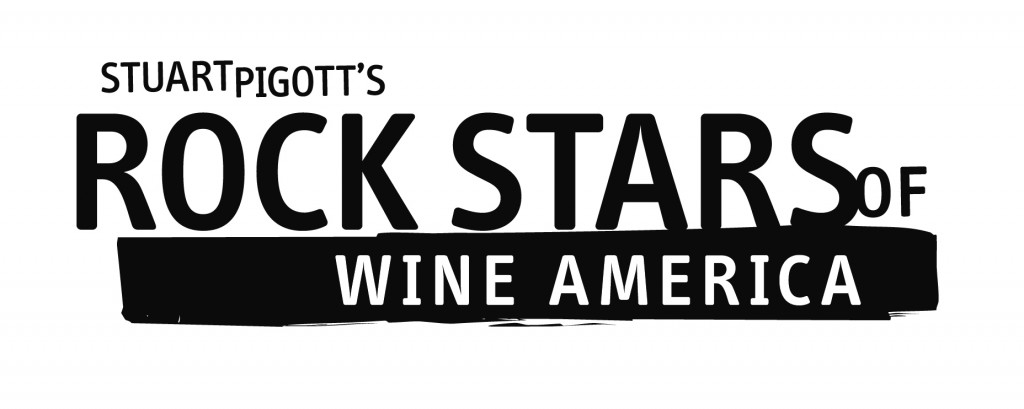The above photographs shows me seen from the viewpoint of a glass of wine while I’m tasting, and I have to admit that it’s a pretty scary sight! If I was that glass of wine I would be seriously worried about how Stuart Pigott was eyeing me up, and about how he would treat me when he sniffed and sipped me. I mean, the man has a reputation for heinous crimes of gonzo journalism, so surely his method of tasting and assessing wine is a reflection of that? What terrible fate awaits me the glass of wine at his hands?
The purpose of this blog posting is to explain how I actually go about my work as a wine taster (as apposed to a gonzo journalist, which is another matter), and it is in some degree an answer to all the shock and awe that my series of stories about the hipster somms of NYWC (New York Wine City) for Grape Collective unleashed since the first of the three parts was published June 17th. However, I am under no illusion that my most ardent critics, the hard core of the Anti Pigott Front that seems to have formed during that period, will take what I have to say seriously, although for me this is a serious matter.
Let me start by saying that I wasn’t always as thorough in my approach to wine tasting as I am today. If we turn the clock back 20 plus years I had the right general idea, but I sometimes got a bit emotionally involved in the wines I was assessing. Today, the most important thing for me is to taste with a cool head, because this is what’s necessary to get as close as possible to my prime goal of openness and fairness, that is treating every wine the same in order to give each of them the same chance of impressing me.
This isn’t only a question of not favoring certain wines I have positive associations with, but also not mentally marking down those with which I have clear negative associations. For example, it shouldn’t matter if the winemaker is a wonderfully generous person or a complete asshole (and of course some winemakers are complete assholes). Nor should it matter if the brand is famous or completely unknown, the retail price high or low, what grape variety/varieties it was made from, the region of origin, etc. When tasting I often remind myself that all I have in front of me is another glass of wine and that it deserves to be taken as seriously as all the other wines I have tasted and drunk.
This is, I think, where I run into trouble with certain members of the “natural” wine crowd. You see, I have nothing against this category of wine whatsoever. On the other hand, I am not prepared to give these wines a bonus or the kid gloves treatment because they belong to a cool, fashionable, politically correct or otherwise “special” category. They get the same chance as all the other wines I taste, even wines made in huge industrial facilities using all the most modern technology in a programatic way, and/or from vineyards where chemicals were chucked around thoughtlessly and/or scant irrigation water used irresponsibly. Don’t get me wrong, I’m against those things too, but for me they are separate issues from the taste of the finished product.
What am I looking for in a wine, any wine, also a “natural” wine? First of all cleanliness, secondly liveliness, then thirdly harmony. Why those things? Without them the chance that I would want to drink the wine much less serve it to anyone else is very low indeed. Some analytical tests can identify problems of this kind, since, for example, microbial spoilage sometimes results in very particular substances entering the wine (TCA, the cause of cork taint is one very obvious example) that can be measured. However, in the end it is about the impression I get of the smell and taste, and this is relative. What one person calls clean is already dirty for someone else, what is tired for one wine drinker is fresh enough for another. Here there is no choice but to go by your own palate, because that’s what you’ve got to work with, although I do listen and note the opinions of others to see if I am wildly out of step with them. That’s always reason to reconsider, and if possible retaste, before either altering my opinion or deciding to keep sticking my neck out.
An important point to make is that I am not a special person with a remarkable talent. I have gained a certain amount of experience and practice, but that doesn’t make me exempt from the enormous impact that the circumstances of a wine tasting have on its results. The circumstances – in the usual external sense of situation, glassware, weather, etc, but also in the internal sense of what’s going on in my head at the time – greatly shape the way a wine tastes. Retasting is also important for this reason, because one wine doesn’t have a singular immutable taste, rather it tastes a bit differentl every time according to the circumstances. No wine taster is exempt from this effect.
I listed “harmony” third, after cleanliness and liveliness, because it is the bridge to all the more subtle and aesthetic qualities that make certain wines fascinating, delightful, exciting, inspiring and unforgettable. These things are also influenced by the external and internal circumstances. No wine, however lofty its reputation, is exempt from this effect! If “natural” wines often get special treatment today, then it’s important to remember how the Grand Crus of Burgundy and the Grand Cru Classé of Bordeaux also get special treatment in certain circles. And I sometimes make that mistake too when one of my favorite wines is on the table, because I am only human. However, as a wine professional I to always keep at least one eye open for this happening.
That’s a pretty accurate description of how I approach wine tasting, but I forgot just one thing. It’s a prejudice of mine that I’m hoping you will forgive me for, you see I would prefer the wine to be delicious.


